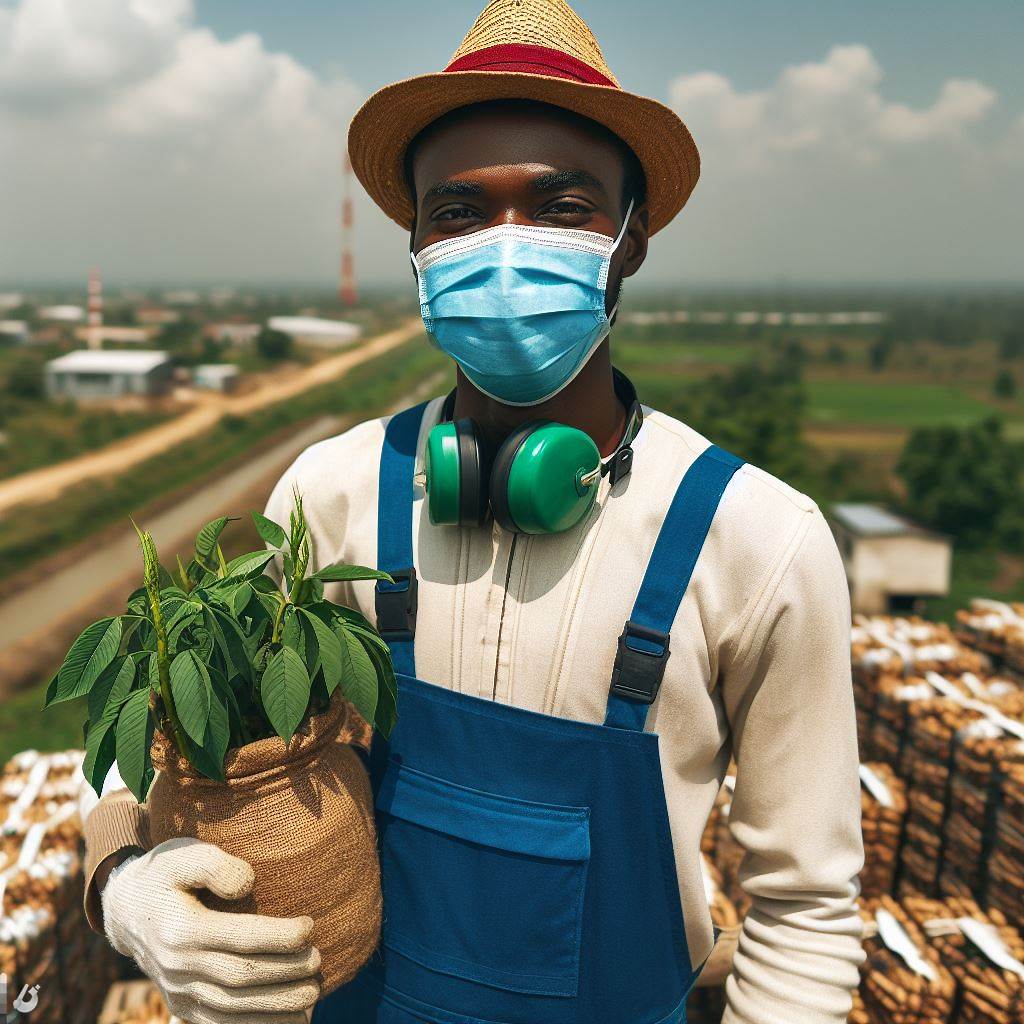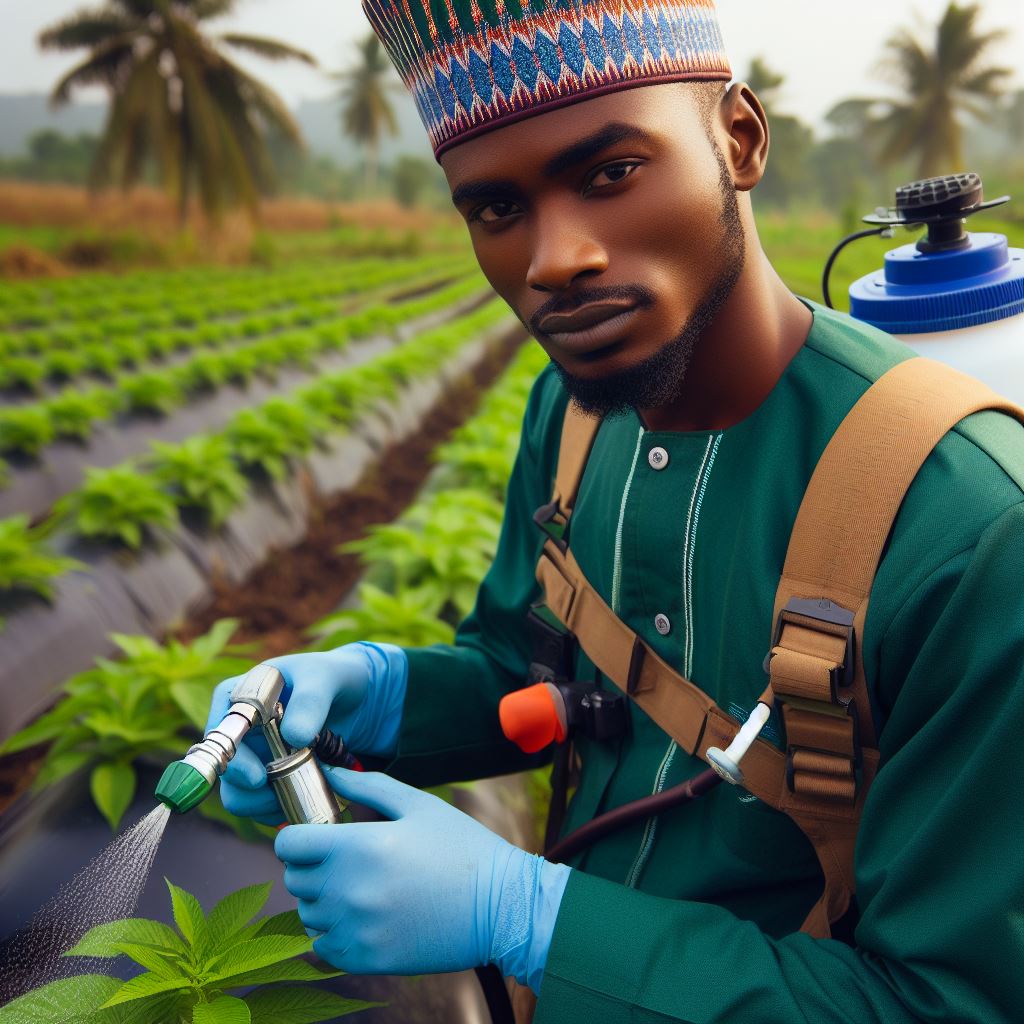Introduction
Sustainable agriculture is a farming method that maximizes productivity while minimizing the negative impact on the environment.
In Nigeria, sustainable agriculture plays a crucial role in ensuring food security and economic growth.
Brief explanation of sustainable agriculture
Sustainable agriculture focuses on using natural resources efficiently, promoting biodiversity, and protecting the soil and water.
It aims to maintain the long-term viability of agricultural systems.
Importance of sustainable agriculture in Nigeria
In Nigeria, sustainable agriculture holds significant importance due to its potential to address food security challenges and boost economic development.
It promotes sustainable livelihoods for farmers, enhances soil fertility, and improves crop yields.
Sustainable agriculture practices, such as organic farming, reduce the reliance on synthetic chemical inputs, preventing environmental pollution and protecting human health.
By utilizing eco-friendly techniques, farmers can produce nutritious food without compromising future generations’ ability to meet their needs.
Moreover, sustainable agriculture enhances the resilience of Nigerian farmers to climate change impacts.
With the implementation of climate-smart practices, such as agroforestry and conservation agriculture, farmers are better prepared to face extreme weather events and adapt to changing climatic conditions.
Investing in sustainable agriculture also contributes to rural development.
It empowers small-scale farmers by providing access to training, financial support, and modern technologies, thus improving their standard of living and reducing poverty levels.
In essence, sustainable agriculture plays a critical role in Nigeria by ensuring food security, protecting the environment, and promoting socio-economic development.
By adopting sustainable practices, Nigeria can build a resilient and prosperous agricultural sector for the present and future generations.
Overview of Crop Protection
Crop protection is an indispensable component of sustainable agriculture in Nigeria.
By effectively managing pests, diseases, and weeds, crop protection ensures higher crop yields, improved food security, and enhanced farmer livelihoods.
In this blog section, we will explore the concept of crop protection, its various methods, and its crucial role in Nigeria’s agricultural sector.
Definition and aim of crop protection
Crop protection encompasses all the measures taken to safeguard crops throughout their growth cycle.
Its primary aim is to secure healthy plant growth, optimize yield, and maximize economic returns for farmers.
By addressing challenges like pest infestations, crop diseases, and weed competition, crop protection ensures the sustainability and profitability of agricultural production.
Various methods and techniques of crop protection
Biological methods
Biological methods rely on nature’s own checks and balances to control pests and diseases.
This involves introducing beneficial organisms, such as predators, parasites, or pathogens, that naturally prey on or disrupt the pests’ life cycle.
For example, farmers may release ladybugs to combat aphids or use the bacteria Bacillus thuringiensis to control certain caterpillars.
Biological control methods are environmentally friendly, sustainable, and compatible with organic farming practices.
Chemical methods
Chemical methods involve the use of pesticides, herbicides, and fungicides to directly control pests, weeds, and diseases.
These products contain active ingredients that target specific pests or pathogens and disrupt their physiological processes.
While chemical control measures can be highly effective, they should be used judiciously to minimize environmental harm and promote the responsible use of agrochemicals.
Cultural methods
Cultural methods modify the crop’s growing environment to prevent or suppress pest and disease incidence.
These practices are aimed at disrupting the pest’s life cycle, reducing access to resources, or enhancing the crop’s natural resistance mechanisms.
Examples of cultural methods include crop rotation, which reduces pest buildup, intercropping to create a diverse and less favorable environment for pests, and the use of resistant crop varieties.
Crop protection plays a vital role in Nigeria’s agricultural sector, which faces numerous challenges due to its tropical climate, diverse crop portfolio, and limited resources.
Pests, diseases, and weeds pose significant threats to crop productivity and food security.
Embracing sustainable crop protection practices is essential for Nigeria to achieve its agricultural potential and meet the increasing demand for food.
Effective crop protection leads to higher crop yields and increased income for farmers.
By utilizing integrated pest management (IPM) strategies that combine biological, chemical, and cultural methods, Nigerian farmers can reduce crop losses and minimize environmental impacts.
This approach promotes long-term sustainability by reducing pesticide use, protecting natural ecosystems, and preserving beneficial insects and biodiversity.
In fact, crop protection is a crucial aspect of sustainable agriculture in Nigeria.
By employing a combination of biological, chemical, and cultural methods, farmers can effectively manage pests, diseases, and weeds.
Implementing integrated pest management practices ensures higher crop yields, improved food security, and enhanced farmer livelihoods.
Embracing sustainable crop protection practices is key to Nigeria’s agricultural success in the face of increasing challenges.
Transform Your Career with Expert Guidance
Get personalized mentorship consulting that’s tailored to your unique path. Our expert advice is actionable and exclusive.
Get StartedRead: Addressing Pesticide Use: Nigeria’s Approach to Safe Farming
Importance of Crop Protection in Nigeria
Increased crop yields and food production
Effective crop protection measures play a crucial role in increasing crop yields and ensuring food security in Nigeria.
By implementing proper pest and disease control strategies, farmers can safeguard their crops from the ravages of pests and diseases, resulting in higher yields.
Reduction of pre-harvest losses
Crop protection measures help reduce pre-harvest losses caused by pests, diseases, and weeds.
By controlling and managing these threats effectively, farmers can minimize the damage to their crops, ultimately improving their harvest and reducing waste.
Preservation of crop quality and nutritional value
Crop protection is essential for preserving the quality and nutritional value of agricultural produce.
By preventing pest infestations and disease outbreaks, farmers can ensure that their crops remain healthy and free from contaminants that could impact their nutritional value.
Economic benefits for farmers and the agricultural sector
Implementing crop protection practices can lead to significant economic benefits for farmers and the agricultural sector as a whole.
By protecting their crops, farmers can increase their profitability by maximizing yields and reducing losses, ultimately contributing to the growth and development of the agricultural industry.
Overall, crop protection plays a pivotal role in Nigeria’s sustainable agriculture sector.
It not only boosts crop yields and food production but also helps in minimizing pre-harvest losses, preserving crop quality, and providing economic benefits to farmers and the agricultural sector.
Therefore, prioritizing crop protection practices is crucial for ensuring a sustainable and prosperous future for Nigerian agriculture.
Read: The Evolution of Agronomy Education in Nigeria
Crop Protection Challenges in Nigeria
Crop protection plays a crucial role in sustainable agriculture, especially in Nigeria, where several challenges hinder its effective implementation.
These challenges revolve around pest and disease prevalence, limited access to effective crop protection products, lack of knowledge and awareness among farmers, and environmental concerns and sustainability issues.
Pest and disease prevalence
One of the major challenges faced in sustainable agriculture in Nigeria is the high prevalence of pests and diseases.
These organisms cause significant damage to crops, leading to reduced yields and economic losses for farmers.
Common pests include locusts, aphids, and stem borers, while diseases such as maize rust and rice blast also pose great threats.
Addressing this challenge requires the implementation of effective crop protection strategies.
Integrated Pest Management (IPM) approaches, which combine multiple control methods, should be adopted to manage pest and disease outbreaks.
These methods include biological control, cultural practices, and judicious use of pesticides to minimize their negative impact on the environment.
Limited access to effective crop protection products
Another significant challenge in Nigeria’s sustainable agriculture is the limited availability and accessibility of effective crop protection products.
Farmers often struggle to obtain high-quality pesticides, herbicides, and fungicides, which are essential for combating pests and diseases.
This limitation is primarily due to inadequate distribution systems, high costs, and weak regulatory frameworks.
To address this challenge, the government and relevant stakeholders must work together to improve access to effective crop protection products.
This can be achieved by establishing robust distribution networks, subsidizing the cost of inputs, and implementing stringent regulations to ensure the availability of quality products in the market.
Lack of knowledge and awareness among farmers
Many farmers in Nigeria lack the necessary knowledge and awareness regarding crop protection practices.
They often rely on traditional and outdated methods, which are often ineffective in addressing contemporary pest and disease challenges.
This lack of knowledge limits their ability to protect their crops adequately and maximize their yields.
Educational and extension programs play a crucial role in addressing this challenge.
Training initiatives should be implemented to educate farmers about modern crop protection techniques, the proper use of pesticides, and the importance of preventive measures.
Increasing awareness through workshops, seminars, and farmer field schools can empower farmers with the knowledge needed to improve their crop protection practices.
Environmental concerns and sustainability issues
Environmental concerns and sustainability issues pose additional challenges to crop protection in Nigeria.
Misuse or overuse of pesticides can lead to environmental pollution, damage to ecosystems, and health risks for humans and animals.
Furthermore, conventional crop protection practices often have a negative impact on soil fertility and biodiversity.
To ensure sustainable agriculture, farmers need to adopt eco-friendly crop protection practices.
This includes reducing reliance on chemical pesticides and embracing alternative methods such as biological control and organic farming.
Integrated approaches that focus on long-term sustainability and preserve the natural ecosystem are vital for addressing these concerns.
In short, crop protection faces several challenges in Nigeria’s sustainable agriculture sector.
Pest and disease prevalence, limited access to effective crop protection products, lack of knowledge and awareness among farmers, and environmental concerns and sustainability issues are the key obstacles.
However, with concerted efforts from all stakeholders, including government authorities, farmers, and researchers, these challenges can be overcome, leading to improved crop productivity, environmental sustainability, and ultimately, enhanced food security for Nigeria.
Read: Innovations in Nigerian Environmental Protection Strategies

Sustainable Crop Protection Solutions in Nigeria
Farming is a crucial industry in Nigeria, providing food security and employment opportunities for millions of people.
However, the sector is faced with numerous challenges, including pests and diseases that negatively impact crop yields and quality.
To ensure sustainable agriculture in Nigeria, it is essential to implement effective crop protection strategies.
This section explores various sustainable crop protection solutions and their role in Nigeria.
Integrated Pest Management (IPM) approach
The IPM approach emphasizes the use of an integrated and holistic pest management system that minimizes the reliance on chemical pesticides.
This approach is based on three key principles:
- Importance of pest monitoring and scouting: Regular monitoring and scouting of crops help detect pests and diseases early, enabling timely interventions.
- Cultural and biological control methods: Implementing cultural practices such as crop rotation, intercropping, and biological control methods like using natural predators help reduce pest populations.
- Responsible use of chemical pesticides: Chemical pesticides should be used as a last resort and in adherence to safety guidelines to minimize environmental and human health risks.
Research and development of locally adapted crop protection solutions
Developing locally adapted crop protection solutions is crucial for combating pests and diseases specific to the Nigerian context.
Research institutions and agricultural organizations should focus on:
- Identifying resistant crop varieties that can withstand prevalent pests and diseases.
- Developing effective biopesticides and biocontrol agents that target specific pests without harming beneficial organisms.
- Investigating innovative methods such as the use of natural products and biotechnology to enhance crop resistance and reduce pesticide use.
Farmer education and training programs
Empowering farmers with the necessary knowledge and skills in sustainable crop protection practices is critical.
Education and training programs should be implemented to:
- Provide farmers with information on pest identification, prevention, and management techniques.
- Teach farmers how to implement IPM strategies and the correct application of chemical pesticides, if necessary.
- Promote awareness of the potential risks associated with improper pesticide use and the importance of using protective equipment.
Collaboration between government, research institutions, and farmers
Achieving sustainable crop protection requires collaboration between key stakeholders:
- The government should provide supportive policies, regulations, and incentives to encourage the adoption of sustainable crop protection practices.
- Research institutions should collaborate with farmers to understand their needs, develop practical solutions, and disseminate knowledge through extension services.
- Farmers should actively participate in research and openly communicate their challenges, experiences, and preferences to contribute to the development of effective crop protection strategies.
In general, sustainable agriculture in Nigeria depends on the implementation of effective crop protection solutions.
Embracing the IPM approach, developing locally adapted solutions, educating farmers, and fostering collaboration will contribute to a sustainable and resilient agricultural sector in Nigeria.
Read: Soil Fertility and Management in Nigerian Farms
Case Studies of Successful Sustainable Crop Protection Initiatives in Nigeria
Example 1: Integrated Pest Management in rice farming
One successful sustainable crop protection initiative in Nigeria is the implementation of Integrated Pest Management (IPM) in rice farming.
Farmers are educated on the use of natural pest control methods such as biological control, crop rotation, and resistant varieties.
Through the adoption of IPM practices, farmers have reduced their reliance on synthetic pesticides while effectively managing pest populations.
This has resulted in improved crop yields, reduced environmental pollution, and increased profitability for rice farmers in Nigeria.
Example 2: Locally sourced organic pesticides in vegetable production
In vegetable production, Nigerian farmers have successfully adopted the use of locally sourced organic pesticides as an alternative to synthetic chemicals.
These organic pesticides are derived from readily available plants such as neem, ginger, and garlic.
By making their own organic pesticides, farmers reduce the cost of production and minimize their dependency on costly synthetic pesticides.
Additionally, these organic pesticides do not have negative impacts on human health or the environment, making them a sustainable option for crop protection in Nigeria.
Example 3: Farmer field schools promoting sustainable crop protection practices
Farmer field schools have been established in Nigeria to promote sustainable crop protection practices among farmers.
These schools provide hands-on training and education on integrated pest management, organic farming methods, and other sustainable crop protection techniques.
Through farmer field schools, farmers learn how to identify pests, diseases, and weeds, and implement appropriate control measures.
By applying these sustainable crop protection practices, farmers have experienced increased productivity, reduced production costs, and improved food safety in their agricultural operations.
Overall, these case studies demonstrate the successful implementation of sustainable crop protection initiatives in Nigeria.
Integrated Pest Management in rice farming, the use of locally sourced organic pesticides in vegetable production, and the establishment of farmer field schools all contribute to sustainable agriculture practices in the country.
Through these initiatives, Nigerian farmers are able to protect their crops from pests and diseases while preserving the environment and ensuring long-term agricultural productivity.
Conclusion
Crop protection underpins the bedrock of sustainable agriculture in Nigeria.
Without it, the nation’s food security and economic stability are at risk.
Pests, diseases, and climate change threaten crop yields, exacerbating poverty and food scarcity.
Investing in sustainable crop protection practices is paramount. It aligns with global sustainability goals while bolstering Nigeria’s agricultural resilience.
This investment isn’t solely financial; it encompasses education, technology, and community involvement.
The significance of crop protection in sustainable agriculture cannot be overstated.
It transcends mere pest control; it’s about cultivating a thriving ecosystem that sustains both crops and the environment.
A call to action resounds through the agricultural landscape of Nigeria.
Governments, private sectors, and individuals must collaborate to enhance crop protection strategies.
Policies fostering sustainable practices should be implemented, incentivizing farmers to adopt eco-friendly methods.
Empowering farmers with knowledge and tools ensures effective crop protection.
Training programs on integrated pest management and organic farming can revolutionize agricultural practices.
Access to affordable and safe agrochemicals also plays a pivotal role.
Increased investment is the cornerstone of progress in sustainable crop protection.
It sparks innovation in research and technology, paving the way for resilient farming practices.
Moreover, supporting smallholder farmers in adopting sustainable methods is imperative.
Their contribution is significant in the nation’s food production and empowering them fortifies the entire agricultural ecosystem.
Crop protection is the linchpin of sustainable agriculture in Nigeria.
A concerted effort to bolster investment and support in sustainable practices is crucial for a thriving agricultural future.
The time to act is now, ensuring a resilient and sustainable food system for generations to come.




